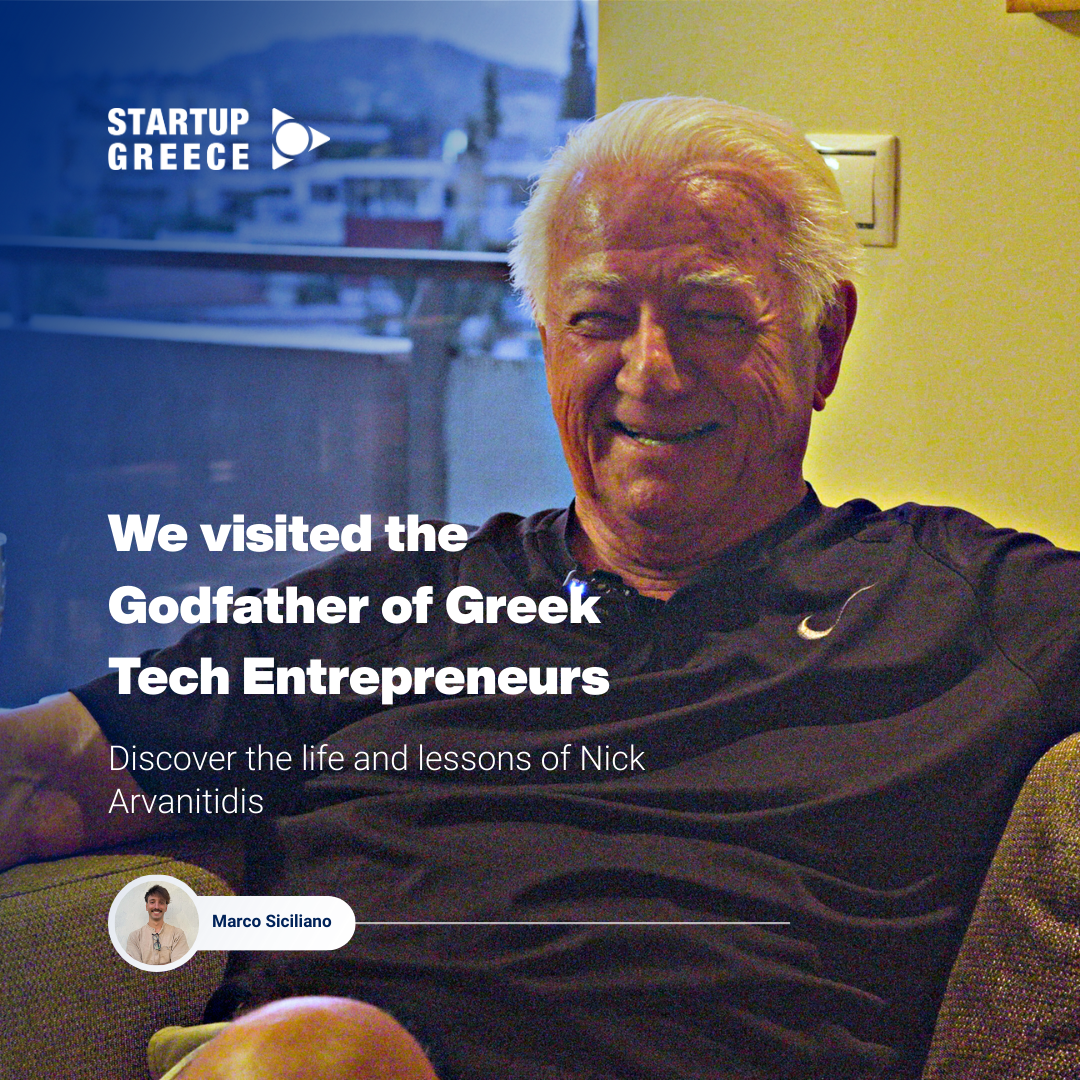
We visited the godfather of Greek tech entrepreneurs in the US – here’s what he told us
September 3, 2025 • by admin
If you ever strolled through the lively streets of Psychico in Athens, you might have inadvertently sat in the same cafe with one of the most influential Greek entrepreneurs in modern history. This summer, Nick Arvanitidis welcomed us into his summer apartment while helping with a book being written about his life. He agreed to share his story with us, along with the entrepreneurial lessons he has learned along the way.
Who’s Nick Arvanitidis?
Now 85 years young, Nick was born in Komotini, East Macedonia and Thrace region of Greece.
As he likes to highlight, the experience at the reformatory institute of Tsotyli at the age of 12 – where professors were taming his wild temperament with old school manners – has been more life-changing than his future at Stanford University.
Nick left for the US in 1959 from Thessaloniki; in fact, he had never been in Athens until briefly coming back to Greece after graduating in 1963.

In the US, Nick does “all the chapters in the book”, as he likes to recall, working as a dishwasher, cub driver, waiter, loading boats, the list goes on and on…
He excels as an undergrad in electrical engineering, gets selected by several Ivy League universities and finally chooses Stanford, where his life will change forever.
Entrepreneurship DNA and risky choices
Nick’s pioneering spirit wasn’t hard to notice in many stages of his life and career. However, the first early sign of his entrepreneurial DNA dates back to his graduation years at Stanford.
Refusing a PhD at Stanford
Ever heard of the idiom “don’t bite the hand that feeds you?” Though not literally, in 1964 Nick did something that for most would have been considered suicidal.
In those years, Nick finished his MS at Stanford when Prof. John Linvill offered him a scholarship for PhD work with transistors.
After 3 months, Nick couldn’t continue living with the gut-wrenching feeling of working for something he was not loving, so he did what most people would fear to even think of: spilling it in front of John, his professor and employer – pretty much the mouth that was feeding him.

John calls his brother William Linvill, who at the time had just returned from MIT to create an institute of engineering and economic systems at Stanford. For William, Nick was that interdisciplinary type of guy who could solve problems across mathematics, economics, and marketing. This is how Nick fell in love with William’s ideas and got his new PhD scholarship.
Founding 2 companies
After completing his doctorate and a brief stint as a lecturer, Nick collaborated with Roy Lave, an industrial engineer and owner of a consulting company. By May 1968, Nick said he was earning $24,000 per year, enough to support his family and live comfortably at the time.
Nick once again demonstrated his entrepreneurial mindset by becoming a partner in Roy’s company. He brought in two Dutch colleagues, Dirk and Jake, who were praised by Nick for their working culture. Shortly thereafter, the three co-founded INTASA INC., Nick’s first think tank and company.
❜❜ Nowadays, CEO is often a synonym of arrogant a*s. I always wanted to work with people who were better than me at something. I was their boss, but I learned more from Jake and Dirk than they probably did from me.
Thirteen years later, Nick founded Sequus Pharmaceuticals, a drug delivery company specialising in cancer treatment and systemic infection. In 1995, Nick and his team’s research led to the FDA approving DOXIL, nowadays used for breast and ovarian cancer treatment. The same year, successful yet exhausted, Nick retires.
Early retirement as a new chapter
Nick stresses a lot about the importance of shifting away from the popular consideration of retirement as a way to shut down, consuming wealth, and just getting older.
Instead, he saw these years as an opportunity to change his lifestyle and thinking by reading more and spending time with his family.
These were also the years during which Nick decided to give more to the community of Greek founders in the US. He did plenty of seed investments, started several companies, and in 2009, he founded the Silicon Valley Greek Fund.

Tips for Greek startup founders
Nick stresses the importance for Greek startup founders to differentiate themselves in today’s market.
Nick’s first recommendation is to create a meaningful goal that is greater than money. It’s fundamental for startup founders to have a drive within during the worst days, and as Nick previously reminded, the only way to have that drive is to love what you do.
His second advice is more practical. He emphasises the fundamental need of every early-stage company to have someone who can take over the financial activities and someone who can take over the operational activities – two staples of every new company’s survivability.
The third advice is about culture.

With this quote, Nick wants to underline how new Greek entrepreneurs should transform the national business culture to facilitate economic growth and investment opportunities.
About the future and investment predictions
Nick’s investment predictions prioritise growth in computer science, biotech, and as a recoil of AI expansion, the business of Intellectual Property, which in Greece is still undersaturated.
At the question “What about the future?”, Nick didn’t share optimism. Instead, the godfather of Greek tech entrepreneurs — as we like to label him — showed scorn for the current political situation in the US and geopolitical balance in the world.
Technology-wise, Nick thinks there’s too much obstinacy or aggressive betting on AI, which won’t have a huge payout and technological advancement and won’t necessarily leave space for greater days.
❜❜ I have deep emotional roots in Greece. There’s no way, whenever I come back here, I won’t go back to Komotini, where my journey started.
Article written by: Marco Siciliano | Journalist intern
admin
